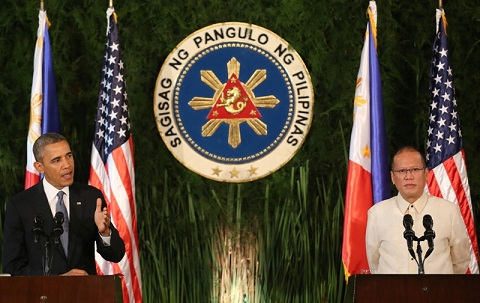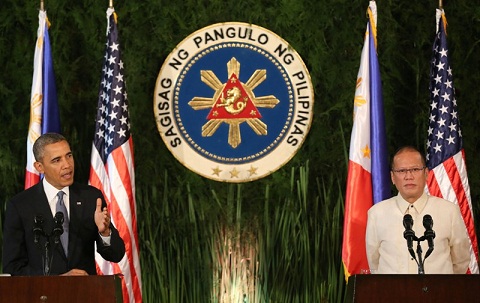By ELLEN T. TORDESILLAS
U.S. President Barack Obama’s candid answers to the two questions from Filipinos reporters whether the United States will come to the defense of the Philippines in case of an armed conflict with China over territorial disputes in the South China Sea disappointed a lot of Filipinos who expected him to say that the American soldiers who will be coming under the Enhanced Defense Cooperation Agreement will be side-by-side Filipinos in blocking China’s expansion in South China Sea.
Obama didn’t say that in his joint presscon with President Aquino in Malacañang Monday. Instead he reminded the public that the United States and China have a “constructive relationship.”
“ There is enormous trade; enormous business that is done between the United States and China; a whole range of issues on the international stage in which cooperation between the US and China are balanced,” he said.
He said: “ So our goal is not to counter China. Our goal is not to contain China” but “ to make sure that international rules and norms are respected, and that includes in the area of maritime disputes.”
Obama made it clear that the United Sates is not a claimant of any part of the South China Sea, where the Philippines,China, Brunei, Malaysia, Vietnam and Taiwan have staked territorial claims. What’s important to them is “, freedom of navigation that allows for continued progress and prosperity.”
R.G. Cruz of ABS-CBN asked the first question: “Will the US defend the Philippines in case the territorial disputes with China in the West Philippine Sea or the South China Sea become an armed conflict? ”
It was followed up by Christian Esguerra of the Philippine Daily Inquirer who re-angled the same question: “Will the Mutual Defense Treaty apply in the event that the territorial conflict with China escalates into an armed conflict?”
As expected Obama made the same reply:“Well, let me repeat what I said earlier….”
The questions were embarrassing because they reflected our mendicant mentality and our fantasy about America. But they had to be asked because many Filipinos wanted to hear from the leader of the world’s superpower that he will take care of us if we get clobbered by a neighborhood enemy that is the world’s number two superpower.
You would not expect that kind of question from a Malaysian, Singapore, Thai or Vietnamese reporter. We have yet to hear the same question from a Japanese reporter whose country has a much more serious territorial conflict with China..
When Obama spoke before war veterans and servicemen at Fort Bonifacio yesterday about “iron clad” commitment to defend the Philippines under the 1951 PH-US Mutual Defense Treaty, media spinned it as a change of tune.
Media conveniently sidestepped the fact that the MDT does not cover the disputed territories in Spratlys. In fact at the Monday presscon, Obama said: “And we don’t even take a specific position on the disputes between nations.”
In answer to a question from reporters accompanying him about the situation in Ukraine and the perceived weakness of his foreign policy,Obama gave a reply that is applicable to the armed conflict scenario in the Spratlys:” My job as Commander-in-Chief is to look at what is it that is going to advance our security interests over the long-term. To keep our military in reserve to where we absolutely need them.”
Obama understandly was being careful with his words even when he wanted to disabuse the delusions of many Filipinos of the importance of the Philippines to America.
Not Robert D. Robert D. Kaplan, chief geopolitical analyst for Stratfor, a private global intelligence firm, and author of “Asia’s Cauldron: The South China Sea and the End of a Stable Pacific” in his guesting in Fareed Zakaria’s GPS at CNN. He said the China –Japan conflict is more serious. “..the East China Sea is a more acute problem for the United States because frankly speaking the United States probably will not go to the war to defend the Philippines. It’s a poor country, it’s a treaty ally, but not a serious one like Japan is.”
Kaplan also said:“The United States cannot allow Vietnamese or Filipino nationalism to drag the United States into a military conflict with China given how important the bilateral relationship between China and the U.S. for the piece of the world in the 21st century.”
Instead of being disappointed with Obama’s lack of assurance in a conflict with China, we should thank him for being honest with us. We should demand the same from our own officials.

